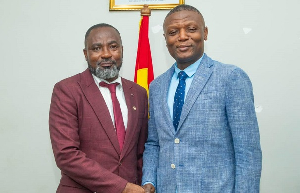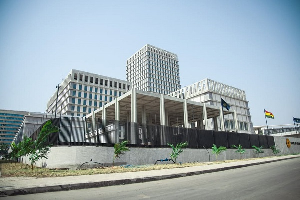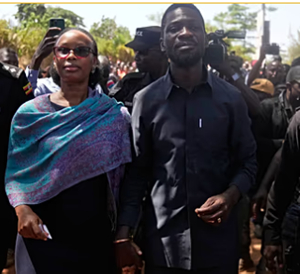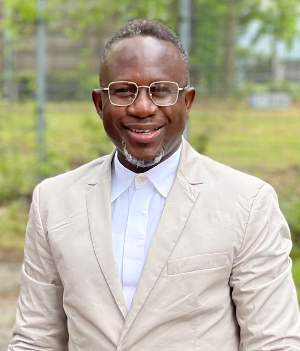Opinions of Sunday, 16 April 2006
Columnist: Bannerman, Nii Lantey Okunka
Our Colonial Police Force Is In Need Of ....
... Fundamental Change
Invariably, preceding as well as the current government has miserably neglected our police force. Neglect notwithstanding, let us be wickedly frank and say that, the main and critical issue with the police force is corruption. The only other problem that comes to mind of equal importance is competence. Then there is the stiff bureaucracy, inadequate resources, lack of proper training and oversight to get the job done. These nutty knots eases into ineffective law enforcement. Without law enforcement, you have indiscipline, violence, crime, corruption, safety issues and a lack of security. The culture of violence gains currency when our law enforcement regime looses its teeth. The current situation does not systemically align with the president?s push for foreign investors. They won?t come if it is unsafe and legally unstable. To put the basics for any economy in place therefore, I mean before any take offs, implied or explicit, law enforcement must be in mint condition. The laws of the country must be enforceable and reasonable. A lawless country is one in which doing business becomes too risky. The faith of the citizen and foreigner in the law is critical to building economic confidence and infrastructure. When people come to a common realization that the laws will not be enforced, our economy and development stands to suffer. Law enforcement is also vital to peace and tranquility for development.Is there anyone out there who believes that our police force is not in need of deep-seated repair? So, how do we reform a colonial police force to make it meet our current and growing needs? The first thing that needs to happen is a rewrite of the mission statement for the police force. A lot has changed since the British left us with the kind of force structure that we continue to nurse laboriously. Mission statements often reflect why institutions exist (focus). Why does our police force exist and what do we want it to do? Once we nail the mission, we can set out to define vision, strategy, programs and plans. I think the police force must be structurally realigned to reflect the current needs of the nation. The centralize police structure seem not to be working too well. It is fairly obviously that local coverage is seriously lacking. If armed robbers can mount roadblocks in local areas and successfully rob travelers, without swift response from the police, then we need more local coverage. The thugs know this and they are working it to their advantage. The least that should occur is a level of decentralization that allows local units to make decisions locally, perhaps, with some kind of independent body to supervise and address complaints about police behavior. Localize funding initiatives, in addition to central government grants, could also help bolster the performance.
One of the more worrisome aspects of our police force is its politicization. If I had my own way, the position of IGP will not based on politics but merit. The nasty aspect of this political game relates to the various leaders at all levels who are potted in place by the newly appointed IGP. In effect, with every political regime comes a new set of leaders. Why must we run a police force based on politics instead of merit? The current attempt by the NDC to hire their own security is an indication of how politicized the police is. Do we expect a police IGP appointed by the party in power to relentless go after corrupt party officials? I am of the view that the independence of the police is an idea whose time has come. Yes, we will need some checks and balances, plus vigorous oversight, to make sure that we do not tolerate a runaway police force. Despite the foregoing, we must do all we can to unshackle the police to go after these so-called ?big men?. The only way forward is to give the police a level of autonomy that enables it to do its job without fear or favor.
That our police show gross incompetence is an understatement. It starts with the corruption that surrounds intake into the force. The police force is perhaps, the quickest route to ill-gotten riches. A constable in the police force who feeds his corpulent bosses richly with ?road kill?, is more likely to build a few houses within a short space of time. This is why getting into the police force is not based mainly on merit anymore. In effect, we don?t have our best and brightest doing the job. It is as if corruption is a disease one must succumb to in the force. If you add tribalism and cronyism to the equation, performance is terribly weakened. Many are infected as soon as they hit the ground. For those who went in because of the loot, this just becomes a dream seamlessly fulfilled. For others, the bug strikes and submission become inevitable. We have to start raising the standards for intake and change the training program. A continuous training program whose orientation is aimed at customer service, respect for the law, nationalism, economic development and law enforcement, professionalism, the dynamics of our economy and other relevant areas. We need sorely, a police force with a new mindset that works to move our nation to its developmental goals. .
Lets face it, it is not fair to ask the police to do a job for which they are not either trained or properly equipped. I will never forget the day when the police inspector showed me a cell phone that he bought so he can provide service to selected clients within the community. These are paying citizens who make it possible for him to afford the cell phone and a few goodies. So for these clients, prompt service is assured. What happens to the rest of us? Must we have a police force positioned to only serve the rich or those who can afford it? Why do we put our force is such a compromising situation? Do we expect our decaying police force to fight these computerized high-tech Uzi-totting criminals successfully at this level of capitalization? As I speak, there are police stations in Ghana without phones and cars? There are police officers with tattered or badly faded uniforms and Charlie ?wotee? to match. Remember those jungle boots that we wore as boys? Well, that is what some of them are left with. This must change if we want a modern police force equipped to fight crime and enforce the law. Our police infrastructure has whittled to a pulp. Visit the nearest police barracks and what you see is entrenched squalor. Old dilapidated buildings begging for paint and common decency from its inhabitants. Maybe we ought do away with these socialist style barracks and allow the police to buy into low cost housing programs for their sacrifice. An agile and mobile police force is one that is littered throughout the community. Stationing everyone in one location may not be the way forward. Also, I am not sure if we have adequate accommodation for all members of the police force. How about a privately owned rental program that is well maintained?
President Kufour was helpful in procuring cars for our weathered police force. Unfortunately, this effort can be likened to adding more water to a leaky bucket. The intention was certainly good but like everything else in Ghana, we have to look at it in a more comprehensive and systems manner. Quick fixes, designed to look politically good does not get the job done in the long run. What good is a police force with limited modern cars if they don?t have basics like phones, technological networks, decentralized decision-making, effective training and high-powered weapons to pare down these thieves? Our police force needs comprehensive review and restructuring to make it functional and need driven. We need a new kind of lean mean police force with preemptive mentality designed to serve the citizen flawlessly.
I don?t know what the pay structure looks like for the police force. However, I doubt most police officers really rely on their pay. In the Ghanaian context, where most are paid for underperforming, it is sort of difficult to call for better pay for a specific group. The reason is that all others will start demanding pay increases with little to show for it. Despite the foregoing, I still believe that given the nature of police work, we must pay them well. We can be very creative with police pay. I am certain that pay for performance is something that will work well for the police. Also, we can institute a bonus system for police officers whose work show result over and above expectation. This means that, we must have rigorous evaluation and feedback loops that enable us to assay what they do. Recognition and awards systems will help to sustain performance.
Ghana has a stiff and convoluted bureaucracy. This in turn provides avenues for police officers to take bribes. Take a case of a motorist who lives in Accra. He or she is traveling to Cape Coast and falls into the long arms of the police. Granted that the radar gun in rusty but a victim they surely have. Now, for a speeding ticket, the motorist must be able to either pay from where she lives or attend court locally. Here is a motorist who is determined to pay his or her fine into state coffers but the prospect of going to court in Sekondi at a time when petrol is selling precariously close to $4 a gallon is enough to buckle his or her knees. Meanwhile the police folks are advising him or her to pay the bribe and move on. They claim even lawyers and doctors pay and they have the phone numbers and business cards to show. Folks, it does not take a rocket scientist to observe that our bureaucracy empowers the police to extort bribes. Priestly innocent citizens are left with no better options but to pay bribes into private pockets. We must change and simplify the system. We should have a computerized ticketing system in place that allows people to pay reasonable fines into state, not private coffers. The easier and simpler it is the more money we will have in the coffers.
One of the more effective ways of making the police effective is to energize the press and citizens to report corrupt police officers for swift and palpable action. This means that citizens will also learn not to be partners in crime by offering bribes. The more police officers are exposed and dealt with, the better off we are. I don?t know if Ghana has a provision that allows citizens to arrest corrupt police officers or not. If we don?t, we must enact one immediately. Sting operations aimed at weeding out corrupt police officers should be a daily occurrence. We must have stiff fines and prison sentences for police offices that fool around with the law. In the end, it will take courage from the citizens to expose corrupt officers. However, citizens will only come forward if they feel that the law will work and their identities will be protected. We must take steps to create a system that rewards bold citizens for exposing corrupt police officers. The starting point is an informed and energized populace supported by well align institutions that work and stiff parliamentary oversight.
The head of the police force, politicians, and leaders alike, must make it a point to speak up against corrupt practices. For example, why can?t the IGP outlaw the practice where a police officer can take your license and give you a chit indicating that he or she has your license? The law requires that all drivers carry their license all the time. If you don?t have your license physically on you, you have twenty four hours to produce it at the nearest police station. So why must a police officer arrogate to him or herself, the right to confiscate your license? Of course the bigger problem is a lack of information network that makes it easy for the officers to log offenders in. Why can?t we create a licensing information system that is networked throughout the country in this day and age? I mean, can we charge Prof. Andam and his helicopter inventing crew at KNUST to create a computerized police network for the country? Come on KNUST you should be able to design a system for us! Without such basics, is our economy ready to take off as alleged by Prof. Asenso? Has anyone reviewed the usefulness of a driver?s license in any economy that has taken off?
Let us not kid ourselves by assuming that corruption will go away overnight. Given our economic reality, we really should not be too surprised to see corruption erupting all over the place. Saying the latter does not mean that I endorse corruption. All it means is a realistic reading of the landscape. For some, corruption is the difference between survival and death. For others it is just a question of leech style greed. Whatever the situation is with these police officers, we are not going to weed out corruption from the police force overnight. What we can do for sure is to start denting the corruption that has ossified in the force. If our police system does not work, the economic take off that we keep hearing about will be nothing but a mirage. We must not fail to make the systemic and strategic link of the police force to our developmental goals. The last thing we want is economic depression laced with full-blown crime, indiscipline, violence, and lawlessness. Yes, poverty aids criminal activity but with a good enforcement regime, we may sturdy the situation before it gets out of hand. The police force must radically change to meet out current needs.
The police force does not operate in a vacuum. Reforming the force alone in a sea of corruption will not have the intended impact. To comprehensively deal with the police rot, we must reform the bureaucracy, the laws of the land and impinge on the mindset of our folks. A whole host of events have to happen to make this work in the long run. Perhaps the most telling reform that might help deal with the police is law reform. If we change the colonial laws into more reasonable yet effective and simplified laws, it might loosen the stiff bureaucracy and pave the way for a more fluid system that is customer friendly.
Technology is also another big player in the game of reform for the police. As always, we need leadership in this efforts and I am yet to see any politician in Ghana make this a cause. Where are the leaders on this?















